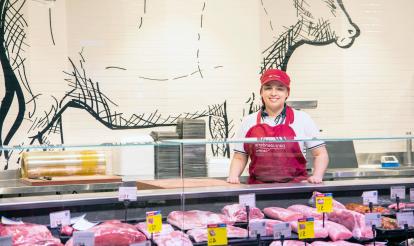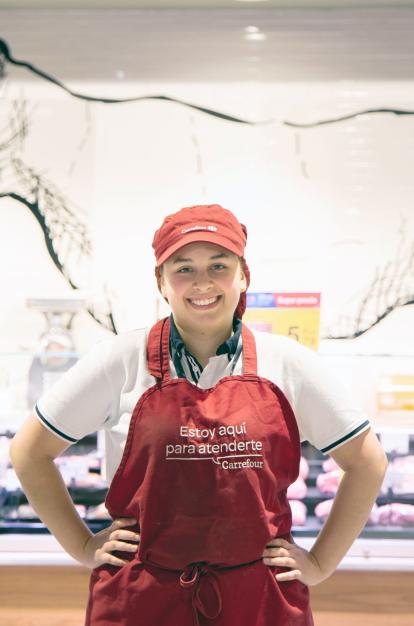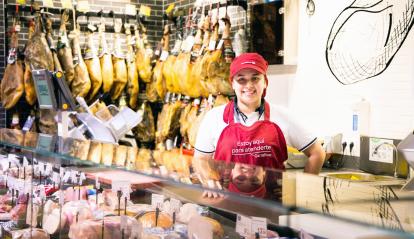
You are reading:

You are reading:

02.07.24
7 minutes readThanks to the coordinated work of the Incorpora programme of the ”la Caixa” Foundation, the Tomillo Foundation and Carrefour Spain, Mariela Aguirre received specific training in the fresh food sector, a field where there is a shortage of skilled workers due to a lack of generational replacement. A year after completing her training, Mariela now has a permanent contract as a butcher’s assistant with the supermarket chain and dreams of advancing within the company.
Five years ago, Mariela Aguirre arrived in Spain from Guatemala with her mother and aunt to start a new life. On completing her secondary education, the 23-year-old decided to enter the job market. “The problem was that I couldn’t find a job other than domestic service,” recalls Mariela, for whom everything changed when she found out about the ”la Caixa” Foundation’s Incorpora socio-occupational integration programme.
Mariela searched for all the information about the programme and made an appointment for a first interview at the Tomillo Foundation, one of the 38 social organisations that work with the Incorpora programme network in Madrid.

For four decades, the Tomillo Foundation has been working with young people and their communities to improve both their employment opportunities and living conditions. “We have programmes for Second Chance Schools with formal training, child support programmes to help them succeed at school, and specialised training for employment,” explains Paula Gómez Osorio, training and employment technician at the Tomillo Foundation. She is in charge of implementing training projects that respond to both the talent recruitment needs of companies and those of job seekers, among other tasks.
In 2023, the Incorpora programme established a partnership with Carrefour to organise 10 courses in eight cities in Spain for people in vulnerable situations to work in the fresh food sector. “At Carrefour, we encounter the difficulty that preparation for this profession is not regulated. In other words, professionals are generally trained on the basis of experience and on-the-job training in companies in the sector, or through job placement programmes like Incorpora,” says Gloria Cuadrado, director of selection, development, training, transformation and human resources at Carrefour Spain, who predicts that the demand for fresh food professionals will continue in the future, as there is a shortage of qualified workers due to a lack of generational replacement: “Customers and companies need them, so we’re working hard, both with our own training and in collaboration with other organisations, to train those interested in taking advantage of this opportunity.”
One of these courses was organised by the Tomillo Foundation’s Incorpora Training Point, and Mariela was one of the people who successfully completed it. “Although I had no experience in the fresh food sector,” she recalls, “I had always liked the idea: cutting the meat yourself, knowing which piece you’re going to eat, being the one who decides. The Incorpora programme gave me the opportunity to learn a trade.”
The success of the Incorpora programme is the result of the joint commitment and networking of the ”la Caixa” Foundation, the social organisations and the companies involved in the programme, and one of its special features is precisely that the training offered must be in demand in the labour market. “This is one of the reasons why the training we design at the Tomillo Foundation’s Incorpora Training Points is so dynamic,” explains Paula Gómez Osorio. “When certain sectors become saturated, we focus on others to respond to market demands, in this case for example, the butchery and fishmonger trades, whose professionals are in danger of disappearing because fewer and fewer young people want to train in these professions.”
The staff at the Tomillo Foundation work with young people and their families, but also with adults and people with diverse backgrounds, particularly those who, for various reasons, have not had access to education, young people who have dropped out of the traditional education system and individuals who are unemployed, among others. “The insertion pathways are personalised and we take into account their work history, education and personal and life circumstances,” explains Paula Gómez Osorio.
Carrefour was involved in the selection of participants in the training, a key process as both competence and motivation are taken into account. Following this process, the selected individuals begin a two-month training course that covers both technical knowledge of the fresh food sector and the development of transversal and socio-emotional skills. Topics include customer communication, conflict resolution and time management.
“In the training, they help you create a curriculum, use digital applications, relate to the customer, learn how to place the pieces in the shop, know how to hold a knife or how to debone a chicken... It’s both in-person and online training, which in my case was great because I could fit it around the houses I was working in,” says Mariela Aguirre, who also highlights the quality of the course facilities and materials. “I was surprised that they gave us so much meat to practise with”; a product which, after being used in the training sessions, is donated to community kitchens.
“In 2023, 18,000 hours of training were provided in the cities of Madrid, Las Palmas, Barcelona, Burgos, Valencia, Malaga, Murcia and Valladolid,” says Gloria Cuadrado, who confirms that more than 70% of the people who received this training were hired. “In fact, as a result of the success of this collaboration, we’ve given continuity to the project in 2024 and have also included training to be a fishmonger,” she concludes.
Once the trainee has been hired, the technicians from the Tomillo Foundation continue to monitor the worker to see how he or she is progressing in the company: “In reality, this support depends on the individuals themselves,” says Paula Gómez Osorio. “Sometimes they feel they can manage on their own, and that’s the end of our work. Other times, if the person needs our support, they come back to us after a while. But even when they don’t need us, they usually keep in touch and let us know when, for example, they get a permanent contract or move to a shop closer to their home.”

A year after completing her training, Mariela Aguirre is now a permanent employee at Carrefour. Although for now she wants to continue perfecting her skills in the trade, she does not rule out taking advantage of Carrefour’s internal promotion opportunities and growing within the company. “I still have a few things to learn; I’d like to continue studying and stay at Carrefour, but in a position related to suppliers, which is a subject that really appeals to me,” explains Mariela, whose plans for the future fit in perfectly with the company’s philosophy.
“Professional development and internal promotion have always been pillars of talent management at Carrefour. From a position as a fresh food assistant, employees can opt for programmes such as the School of Leaders to take on greater responsibilities, for example as a team leader in hypermarkets or supermarkets.” This policy is also aligns with the philosophy of the Incorpora project because, as Paula Gómez argues, “although some people may think that they’re selected or hired because of their personal circumstances, that’s not the case. Above all, they are individuals with enthusiasm and a lot of talent.”
In 2023, the ”la Caixa” Foundation’s Incorpora programme facilitated more than 42,000 jobs for people in vulnerable situations, 54% of them for women. This is the highest annual figure achieved by Incorpora since its inception in 2006, and was made possible through the collaboration of almost 500 social organisations and 16,417 companies committed to social responsibility and the United Nations Sustainable Development Goals. Since the programme was launched, the number of placements has risen to 447,284, with the involvement of 91,339 companies in sectors as diverse as hospitality, commerce, cleaning, social and health care, transport and warehousing.